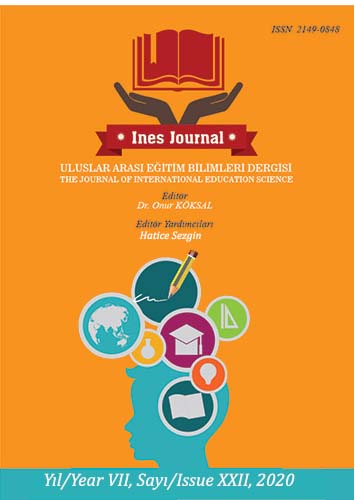Author :
Abstract
Son yıllar içerisinde yapılan uluslararası öğrenci değerlendirme sınavlarında(PISA, TIMMS ve PIRLS) Singapur kazandığı başarılar ile üzerine dikkatleri çekmiştir. Ülkelerin uluslararası sınavlarda elde ettiği başarılar bu ülkelerin sahip olduğu eğitim politika ve uygulamaları hakkında bizlere bilgi vermektedir. Singapur’un bu sınavlardaki başarısı diğer ülkeleri, bu ülkenin eğitim politikası, sistemi, uyguladıkları örnek uygulamalar üzerine araştırma yapmalarına yönlendirmiştir. Eğitim sistemini iyileştirmek için reform çalışmalarında bulunan ülkelerden Türkiye ve diğer ülkelerin, uluslararası sınavlardaki istenen başarıyı sergileyememeleri bu sınavlarda üstün başarı sergileyen Singapur ülkesinin eğitim sisteminin araştırılmasına yönlendirmiş, başarıda etkisi olduğunu düşündükleri özelliklerin ortaya çıkarılmasına yönelik çalışmalara hız kazanmıştır. Bu çalışma ile amacımız Singapur’u eğitimde zirveye çıkaran durumları ve örnek uygulamaları araştırıp incelemektir. Bu bağlamda kaynak taraması sonucu elde edilen veriler yorumlanmış ve Singapur’u zirveye taşıyan örnek uygulamalar başlığı altında açıklaması yapılmıştır. Ayrıca Singapur’u zirveye taşıyan bu özelliklerin bu başlıklar altında gösterilmesi, ülkemizin ve diğer ülkelerin doğru eğitim politikaları ve sistemleri geliştirmelerine katkı sağlayacağı öngörülmektedir.
Keywords
Abstract
Singapore has attracted attention with its success in international student assessment exams (PISA, TIMSS and PIRLS) held in recent years. The success of the countries in international examinations gives us information about the educational policies and practices of these countries. Singapore's success in these examinations has led other countries to conduct research on this country's educational policy, system, and exemplary practices. To improve the educational system of the countries in the reform process in Turkey and other countries, unable to demonstrate success prompted the international exam that exhibits outstanding achievement in these exams have led to the investigation of the education system of Singapore countries, it has accelerated efforts to uncover the features they thought it was the effect of success. With this study, our aim is to investigate and examine the situations that have brought Singapore to the top in education. In this context, the data obtained as a result of the source scanning were interpreted and the example practices that bring Singapore to the top. In addition, the features that bring Singapore to the top are shown under these headings, It is foreseen that our country and other countries will contribute to the development of correct education policies and systems.
Keywords
- Auguste, B., Kihn, P. ve Miller, M. (2010). Closing the talent gap: Attracting and retaining top third graduatesto careers in teaching. McKinsey&Company. http://mckinseyonsociety.com/downloads/reports/Education/Closing_the_talent_gap.pdf adresinden 08.12.2019 tarihinde erişilmiştir.
- Bakioğlu, A. ve Göçmen. G. (2013). Singapur eğitim sistemi. Ayşen Bakioğlu (Ed.), Karşılaştırmalı eğitim yönetimi (ss. 127-155). Ankara: Nobel Akademik Yayıncılık.
- Birbiri, D., ve Ayer, G. (2013, OCAK). Türk Eğitim Felsefesi ve Singapur Eğitim Felsefesinin Karşılaştırması. Ders Ödevi. Kocaeli.
- Cemaloğlu, N. (2018, NİSAN 4). Singapur Eğitim Sistemi. Kasım 06, 2019 tarihinde T.C. Milli Eğitim Bakanlığı: http://barisaybekmetem.meb.k12.tr/icerikler/singapur-egitimsistemi_4596142.html adresinden alındı
- Chang, S.C.A. (2001). Implementation of the “Thinking Schools, Learning Nation” initiative in Singapore. Journal of Southeast Asian Education, 2(1), 13-41.
- Cheah, H. M., & Koh, T. S. (2001). Integration of ICT into education in Singapore. Journal of Southeast Asian Education, 2(1), 147-64.
- Çildir, S. (2013). Singapur/Konuşulan Diller. 12 24, 2018 tarihinde http://www.geziseli.com/singapurda-konusulan-diller/ adresinden alındı
- Dış Ekonomik İlişkiler Kurulu. (2014). Singapur Ülke Bülteni. İstanbul: Dış Ekonomik İlişkiler Kurulu.
- Kaytan, E. (2007). Türkiye, Singapur ve İngiltere Matematik Öğretim Programlarının Karşılaştırılması. Yüksek Lisans Tezi. Ankara: Hacettepe Üniversitesi, Eğitim Bilimleri Anabilim Dalı, Eğitim Programları ve Öğretim Bilim Dalı.
- Koç, A. (2014). Singapur Ülke Raporu. Karacadağ Kalkınma Ajansı Dış İlişkiler ve Fonlar Birimi.
- Levent, F. ve Gökkaya, Z. (2014). Education policies underlying South Korea’s economic success, Journal Plus Education, 10(1), 275-291.
- Levent, F., ve Yazıcı, E. (2014). Singapur eğitim sisteminin başarısına etki eden faktörlerin incelenmesi. Eğitim Bilimleri Dergisi, 121-143.
- Ministry of Education Singapore. (2018). Pre-school. 01.11.2019 tarihinde Ministry of Education Singapore: https://www.moe.gov.sg/education adresinden alındı
- SME (Singapore Ministry of Education). (2010). Building a national education system for the 21st century: TheSingapore experience.
- Schleicher, A. (2011). Lessons from PISA about some of the world’s best-performing education systems.Low, L.E. (Ed.). Lessons From PISA: Vol.2 National Institute of Education, Singapore.
- Tan, J., & Gopinathan, S. (2000). Education reform in Singapore: Towards greater creativity andinnovation. NIRA Review, 7(3), 5-10.
- Tobb, (2013). Dünya talebinin barometresi Singapur. http://haber.tobb.org.tr/ekonomikforum/2013/10/044-049.pdf adresinden 12.11.2019 tarihinde erişilmiştir. EXTENDED ABSTRACT





